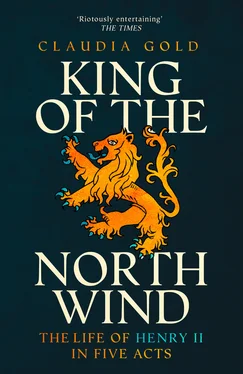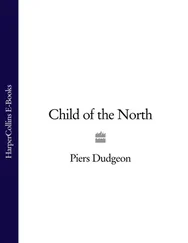IV
While Matilda fought in England, Henry had remained in Anjou, studying with his tutors and learning knightly skills. It is possible that his paternal uncle, Helias, played a part in Henry’s education, acting as his mentor.86
His parents were clever and inquisitive, both were well educated (Matilda received the greater part of her education at her first husband’s German court rather than in England), and they took great care over the young Henry’s schooling. Matilda and Geoffrey had a plan. They would provide their eldest son not only with an exemplary military and political education, but with the tools to enable him to become the Platonic archetype of a philosopher-prince. Walter Map’s claim that Henry ‘had a knowledge of all the tongues used from the French sea to the Jordan’ is undoubtedly an exaggeration; but it gives a hint as to the breadth of his learning. The languages Henry spoke fluently were French and Latin – Walter Map went on to say that he ‘customarily made use’ of them, and later he possibly learned some English.
Western Europe had never experienced such an intellectually exciting period as the twelfth century. Later historians dubbed it the ‘twelfth-century renaissance’ and it defied the Victorian misnomer of the ‘Dark Ages’.87 It was an age that saw the beginnings of humanism, a sense of the importance of the individual, a massive population shift from countryside to town, the rise of the city, the centralisation of government, and the recognition and employment of the greatest intellectuals of the day in the service of the royal administration. It saw an explosion in art, poetry and literature, particularly in the vernacular, as new fiction was explored for the first time since the classical era, and in science, theology and legal reform. It saw the beginnings of the great cathedral schools, the universities and of the soaring Gothic architecture that visually defined the age and fed the medieval Christian soul.
This quest for knowledge was fed by a ‘rediscovery’ of the classical thinkers of Greece and Rome, particularly Christian Rome after Constantine’s conversion, and by increasing contact with the Arab world and the richness of their intellectual traditions, notably in astronomy, medicine and mathematics. Contemporary writers called this movement a renovatio , meaning a rebirth or a renewal, with its underlying connotations of redemption through knowledge.
It was expected that a ruler should be well educated. Henry I and Geoffrey of Anjou were admired for their intellects. William of Malmesbury – monk, historian and devotee of Henry’s uncle Robert of Gloucester – pronounced that ‘a king without letters is [just] an ass with a crown.’88
Henry’s teachers – he had four that we know of – played an enormous role in shaping his interests. They were important not simply because they were clever, but because of the breadth and internationalism of their knowledge and understanding. Two were celebrated scholars, two we know far less about. But we do know that the experience of Henry’s tutors went far beyond the teachings of the church fathers; they had imbibed the wisdom of the philosophers, mathematicians, medics, poets and scholars of Greece, Rome, the Arabs and the Jews.
His first tutor was Peter of Saintes, chosen by Geoffrey because he was ‘more learned in Poetry than anyone this side of the Pyrenees’.89 Peter taught Henry Latin, and told him stories of the Greek and Trojan heroes; he even composed a poem on the Trojan War.90
When Henry was brought to England in 1142, he lived in his uncle Robert’s household at Bristol, where he continued his education under both Robert’s and his mother’s direction. Robert was a scholar. In 1138, Geoffrey of Monmouth dedicated his Historia regum Britanniae (‘History of the Kings of Britain’) to the earl, and it was from this text that Henry probably first became aware of the legends of King Arthur. This was the first time that an author collated and wrote down in Latin, a language the educated classes understood, all the legends connected with Britain’s most famous king. Geoffrey may even have written the text as a reflection of the civil war. Robert had recently made an alliance with Morgan ap Iorwerth, lord of Usk; the Welsh saw themselves as the proud descendants of Arthur.91 And Matilda is possibly portrayed in the text as Cordelia, the loyal daughter of Lear. Geoffrey’s Cordelia is married to a Frenchman and forced to fight her cousin for her birthright.92 It is probable that Henry discussed the book with both Geoffrey and Robert.
His mother, meanwhile, having fled from Oxford at the end of the year, set up headquarters at Devizes, roughly thirty miles from Henry. Henry of Huntingdon enthusiastically called its castle ‘the most splendid’ in Europe.93 It would be the centre of Matilda’s court for the duration of her stay in England.
The chronicler Gervase of Canterbury wrote of the ‘joy’ Matilda experienced in her son.94 It was in England that Henry began his training for leadership. He began to sign himself as ‘rightful heir of England and Normandy’.95 And on the occasions when he was with his mother, he received joint homage from their English vassals.96
Walter Map, in his gossipy and beautifully written Courtiers’ Trifles on the machinations of Henry’s court, later wrote about Matilda’s methods, much of which she had learned from the old king:
I have heard that his [Henry’s] mother’s teaching was to this effect, that he should spin out the affairs of everyone, hold long in his own hand all posts that fell in, take the revenues of them, and keep the aspirants to them hanging on in hope; and she supported this advice by an unkind analogy: an unruly hawk, if meat is often offered to it and then snatched away or hid, becomes keener and more inclinably obedient and attentive. He ought also to be much in his own chamber and little in public: he should never confer anything on anyone at the recommendation of any person, unless he had seen and learnt about it.97
It is not a great leap to imagine that Matilda began to teach her son when he was still very young the political methods learned from her first husband and her father.
At Bristol, Henry, alongside Robert’s younger sons, was taught by Master Matthew.98 Historians are uncertain as to Matthew’s identity. Some believe that he was Robert’s appointment as Henry was living in Robert’s household; however, it would seem that Matthew had been in Geoffrey’s service for years, teaching his two sisters – Henry’s aunts.99 It is likely therefore that Geoffrey sent Matthew to England as part of Henry’s retinue, in consultation with Robert. Both Peter of Saintes and Master Matthew probably initiated Henry into the intricacies of government, working alongside his parents and uncle to teach him the theory as the young boy observed the practice. Henry witnessed his first charter, issued by Geoffrey in June 1138, when he was only five years old.100
Robert undoubtedly had an influence on the young Henry’s education. Robert, who has been called ‘a happy compound of warrior, statesman, and scholar’, had studied enough to attract the admiration of William of Malmesbury.101 Henry I ensured this adored son was well educated, and his library was reputedly vast. It was probably at Robert’s invitation that the renowned scholar Adelard of Bath visited young Henry at Bristol.
Two years later, in January 1144, Henry was recalled to Normandy. It was at about this time that Geoffrey heard of his own father’s death in a riding accident in Acre, in November 1143.102 Fulk and Melisende had two sons together, Baldwin and Almaric; Geoffrey’s brothers were destined to occupy the throne of Jerusalem.
Geoffrey had captured Rouen, Normandy’s capital city. He had never been popular in England, but after his spectacular victories in Normandy and in recognition of his superb military skill, in Angevin and Norman sources he was a hero, ‘a second Mars … a powerful knight … a philosopher in his knowledge’.103
Читать дальше












